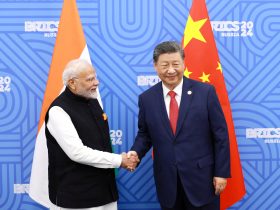
Essentially the most memorable second of King Charles and Queen Camilla’s latest royal tour of Australia and Samoa was Australian indigenous senator Lidia Thorpe’s insult to the monarchy. She was escorted out of Canberra’s Parliament Home after she heckled the King and accused him of genocide. The British media was incensed, calling her “outburst” merely “impolite” and “ill-mannered”.
True, Senator Thorpe’s behaviour could also be unwarranted. Nonetheless, it ensured that the royal go to was something however forgettable. A few days later, the problem of reparations raised by the previous British colonies on the two-day biennial Commonwealth Summit in Samoa was one other tough remedy the British royalty acquired in fast succession.
A Direct Message In Samoa
Set roughly halfway between New Zealand and Hawaii, the summit in Samoa final month noticed King Charles and UK Prime Minister Keir Starmer be a part of leaders from 56 Commonwealth nations. It coincided with the BRICS Summit in Kazan and due to this fact acquired little protection in India. Anyway, the setting might have been distant, however the message on reparations was direct and one that will not be simple to disregard. Good that the leaders of two heavyweight Commonwealth nations, Indian Prime Minister Narendra Modi and South African President Cyril Ramaphosa, have been attending the BRICS summit. Their presence would have made issues tougher for the UK authorities. India was represented on the summit by Union Minister of Parliamentary Affairs, Kiren Rijiju.
However, requires the UK to pay financial compensation and lengthen a proper apology over its function within the trans-Atlantic slave commerce resurfaced with contemporary urgency on the summit. The UK, expectedly, had vetoed the proposal to immediately handle reparations within the summit’s last communique. As a substitute, the doc tiptoed across the difficulty, referencing solely the potential for “future discussions” on “reparatory justice” relating to the trans-Atlantic commerce in enslaved Africans.
Prime Minister Keir Starmer rejected requires an apology and reparations, telling delegates that it was futile to have “very lengthy, countless discussions” in regards to the previous. As a substitute, he urged the previous colonies to give attention to problems with the current, resembling local weather change, which his authorities might assist. Talking on the summit in Samoa, King Charles sounded extra conciliatory: “None of us can change the previous. However we are able to commit, with all our hearts, to studying its classes and to discovering inventive methods to proper the inequalities that endure.”
For the leaders of former colonies, nonetheless, this side-step won’t possible put the subject to relaxation anytime quickly
Apologies From Simply A Few
Privately, some households who owned 1000’s of slaves have apologised for his or her half within the slave commerce. For instance, final yr, descendants of the household of Nineteenth-century British Prime Minister William Gladstone visited Barbados, St. Lucia and different Caribbean islands to acknowledge and apologise for his or her ancestor’s involvement in slavery. John Gladstone, William’s father, owned slaves on plantations within the Caribbean. William Gladstone, nonetheless, was a outstanding abolitionist. Caribbean leaders welcomed the apology, calling it a step in the direction of therapeutic and reconciliation.
Like Britain, most European colonial powers have expressed remorse over their previous sins. However they haven’t formally apologised for it. The one notable exceptions are the Netherlands and Belgium. They’ve apologised for each colonial atrocities and slave commerce involvement, although no financial compensation has been promised.
Britain Owes Former Colonies $24 Trillion
Patrick Robinson, a UN decide, indicated final yr that the UK might owe over $24 trillion in reparations for its function within the trans-Atlantic slave commerce. In a report co-authored by him and revealed final yr in June, he says he considers this determine a conservative evaluation, noting the huge and lasting injury inflicted by the slave commerce. The report calculates that in complete, reparations to be paid by 31 former slaveholding colonial powers—together with Spain, the US and France—quantity to $107.8 trillion. Expressing astonishment, Robinson remarked that sure states concerned in slavery seem to disregard their obligations, stating, “As soon as a state has dedicated a wrongful act, it is obliged to pay reparations.”
Robinson, recognized for presiding over the trial of former Yugoslav President Slobodan Milosevic, emphasised the precept that reparations are an obligation, not an choice. He has been a member of the Worldwide Court docket of Justice (ICJ) since 2015 and has been researching reparations as a part of his honorary presidency of the American Society of Worldwide Regulation. It’s practically apparent that the previous colonial powers, who’re amongst a number of the richest nations on the earth, because of their colonial exploits, look like in no temper to pay compensation packages to the nations affected by the slave commerce
“Am I Not A Man And A Brother”
The expansionist British Empire’s exploitative system was based mostly on three sins towards humanity—colonisation, slave commerce and indentured labour. Indentured labour was focused towards India extra particularly.
One of the vital enduring symbols from the Nineteenth century’s abolitionist motion is the sketch of a Black man in chains. When you take a more in-depth look, it exhibits an enslaved Black man, kneeling in chains, with the phrases “Am I not a person and a brother” encircling him. The picture and the plea punch a deep craving for the enslaved African and Caribbean man’s freedom and equality. This emblem challenged the cruelty of slavery and known as for justice.
The British Empire bears a darkish legacy as one of many largest forces within the trans-Atlantic slave commerce, a tragedy that prompted immense struggling and disruptions. But, it’s only honest to acknowledge on the outset that Britain was additionally house to a strong abolitionist motion that rallied the general public on the grassroots stage and pushed Parliament to abolish slavery in 1833. The Slavery Abolition Act undoubtedly marked a major flip within the international battle towards enslavement. It outlawed slavery in many of the British Empire.
However the abolition of 1 sin gave delivery to a different, equally evil in nature, indentured labour, which immediately impacted India.
Slaves vs Coolies
Which is worse: the brutal actuality of the slave commerce or the ruthless grind of indentured labour—the so-called “coolies” of the British Raj? Every system wore a distinct masks, however all served the identical goal: to maintain the empire on the backs of exploited labour. The slave commerce was uncooked oppression, tearing individuals from their homelands, stripping them of their identification and treating them as property. Then got here indentured labour, not fairly as blatant, however equally unforgiving. This “sanitised” slavery trapped staff in harsh situations with barely a hint of freedom—a palatable substitute for the colonial conscience.
The British Empire ended the slave commerce with the 1833 Abolition Act, but hardly skipped a beat earlier than instituting indentured labour the very subsequent yr, in 1834. Data present that personal plantation house owners actively lobbied the Empire for affordable labour from India, which quickly grew to become the spine of colonial initiatives in far-flung corners of the Empire. A whole lot of 1000’s of Indian labourers—largely poor, unlettered and determined—have been ‘contracted’ to work on plantations within the Caribbean nations and railroads, particularly in East Africa. Many have been coerced into these agreements, typically solely needing to affix a thumbprint to a bit of paper they could not learn. What they signed away was their freedom, shackled to a five-year contract with slim hope for escape from abusive situations. The British Nationwide Library has big archives of papers pointing to a number of incidents of revolt by the labourers, lots of whom have been killed or maimed as punishment.
So, which system bears the higher sin? Arduous to say. However maybe probably the most enduring sin is the claims by a number of apologists within the West—which embrace some right-wing politicians—that these practices helped famine-stricken Indians enhance their lives and that the whole colonial challenge was a part of “civilising” the coolies.
(Syed Zubair Ahmed is a London-based senior Indian journalist with three many years of expertise with the Western media)
Disclaimer: These are the private opinions of the creator






